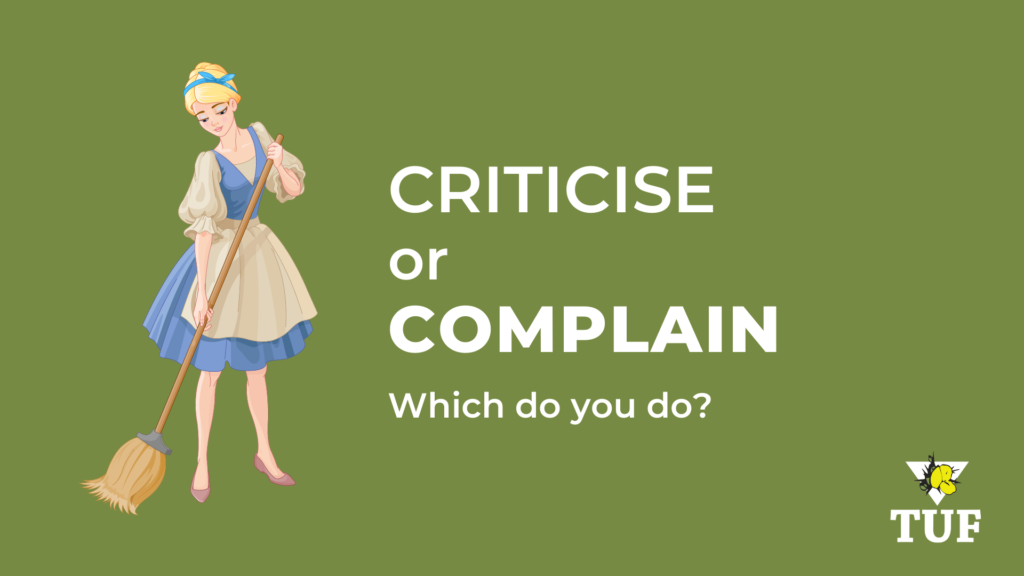
Cinderella had a hard time when her father remarried. The nasty new stepmother and her two prickly daughters criticised Cinderella continuously. They left her in tears as they went off to the ball. However, the Fairy God Mother (FGM) appeared and the rest, as they say, is history.
If the stepsisters and the stepmother were nicer people, they could have complained in a constructive way, rather than criticise Cinderella when things weren’t right. Mind you, if they did that then we wouldn’t have a story to tell; the FGM wouldn’t have turned up; there’d have been no magic; Cinderella’s ball gown would have been a bit ordinary; and the prince may not have even noticed her amongst all the beautiful young damsels at the ball. Even worse, Cinderella may have stayed all night and made a right prat of herself by drinking too much punch, and the prince may have ridden off into the sunset with someone else. Boring to say the least.
Criticism vs Complaining
Anyway, there’s a difference between criticism and complaining. It’s worth knowing the difference to improve relationships at work, as well as with a life partner, and friends in general.
What is the difference?
Complaining is when you say something like this to a person:
When you leave your dirty dishes on the bench in the tearoom it’s difficult for me to make my lunch, and I end up stressed and running late. Could you please put them in the dishwasher?
Criticism is when you say:
You have left your dirty dishes on the bench in the tearoom again! I’m sick of your laziness and disrespect for other people. (Implying – you are not a good person).
Many people fear that if they raise issues with a partner, friend, or colleague, it will lead to unpleasantness and arguing that might end their relationship. So, they stay silent. However, staying silent can have repercussions in other ways, and the build-up in stress may lead to a range of other issues, which the FGM can’t help you with.
In fact, complaining itself is not a problem. Research by relationship expert John Gottman shows that bottling up problems (staying silent) actually ends more marriages than arguing. Complaining, in the big picture, is actually a positive – it gets issues out in the open where they can be resolved. What leads to divorce isn’t complaining; it’s criticism.
Eric Barker writes about this in his most recent book “Plays Well with Others”
Complaining is actually healthy for a marriage. It’s criticism that predicts divorce. Complaining … is about an event, criticism … is about your fundamental personality. To keep your relationship solid, turn your criticisms into complaints. Address the event, not the person.
So don’t be afraid to raise that issue — but don’t make it personal. Address the problem, not the character of the other person. This will more likely lead to conversations that actually make your relationship stronger.
Four more points to keep in mind:
- You don’t have to complain about everything. Decide if it’s worthwhile and important enough. The dishes may sometimes end up on the bench when s/he is in a rush to pick the kids up from school.
- Make sure you say many positive things to your partner or workmate generally; otherwise, you will seem like one of the nasty stepsisters always complaining, which can morph into being experienced as criticism. John Gottman says in a marriage relationship the ratio should be 5:1. Five positives for each negative. In the workplace it should be even higher more like 7:1.
- Don’t have the complaining conversation when you are feeling angry or upset about it; or it might turn into a personal attack. Calm yourself down first (maybe come back later). Seek permission to have the conversation. Make sure the other person is willing to hear from you; if not now, then at some future time.
- Check carefully that you are not criticising the other person when you complain. Remember the big picture of wanting a positive and supportive relationship. View them in the best possible light and view your complaint as an opportunity to make it even better.


